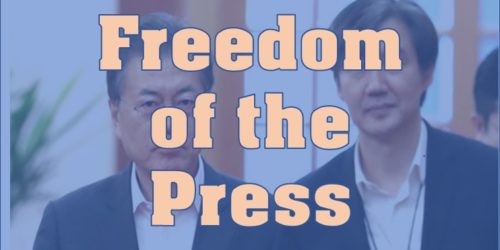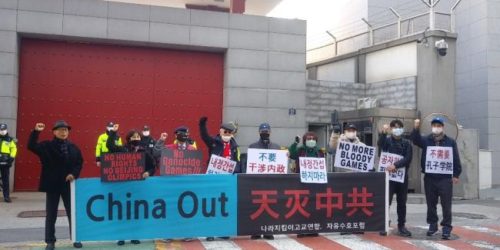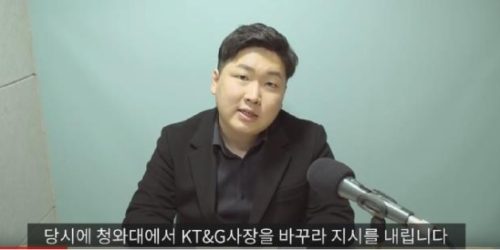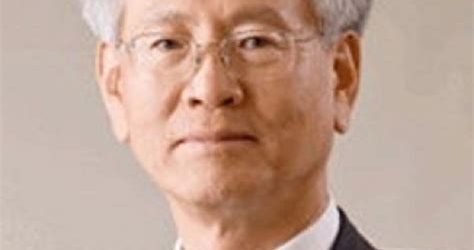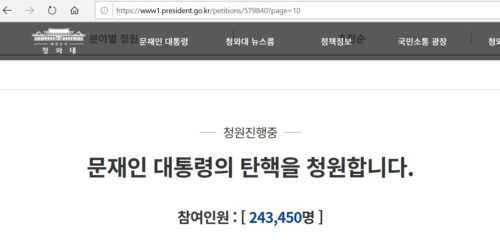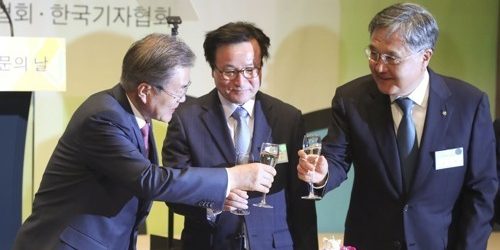South Korea’s Ruling Party to Sign Agreement with Chinese Communist Party (CCP), and with prominent U.S. Think Tank CSIS
2019-7-5, Tara O
The Institute for Democracy (the Minjoo Yeongoowon, 민주연구원, http://idp.or.kr/) is a partisan think tank under the ruling Democratic Party of Korea (or Deobureo Minjoo Dang in Korean, 더불어민주당). The Institute will sign a first-ever policy agreement with the Central Party School of the Chinese Communist Party (CCP). The CCP Central Party School produces the elites of the CCP. Xi Jinping, Hu Jintao, and Mao Zedong were superintendents of the Central Party School of the CCP. Yang Jung-chul (양정철) became the Director of the Institute for Democracy on May 14, 2019 and will visit Beijing July 9-12, 2019 to sign the agreement. There is a concern that the Institute for Democracy will respect and accept the non-democratic and anti-democratic elements of the Chinese Communist Party, including “one-party dictatorship” and “human rights abuses.”
After his visit to China, Yang will travel to the U.S. from July 13 to16 to sign an agreement with the Center for Strategic and International Studies (CSIS) in Washington, DC. The Institute is also pursuing ties with think tanks in Japan, Austria, and Italy.
The Institute has also just completed forming ties with the research institutes under the regional autonomous governments (광역자치단체) all over South Korea. The regional autonomous governments are the governments of provinces and major cities. Liberty Korea Party’s National Assemblyman Jeong Jeom-sig (정점식) pointed out on June 7, 2019 that such ties between the think tanks of the ruling party and local governments violate election law. Jeong said “The Institute for Democracy and Seoul City’s Seoul Institute and Gyeonggi Province’s Gyeonggi Institute signed business agreements…The board of the research institutes for local governments is composed of ex-officio directors and ex-officio auditors who are public officials, so this blatantly shows the intent to use the local governments and public servants as an election base.”
Yang Jung-chul is a close confidant of president Moon Jae-in and is considered to wield significant influence behind the current administration as the central figure promoting Moon’s presidential candidacy. Yang was former South Korean President Rho Moo-hyun’s Public Relations Planning Secretary in the Blue House. Later, Yang worked on Moon Jae-in’s 2012 presidential campaign and after Moon’s loss, Yang became part of a group called Jaesoohoe (재수회), formed by Moon Jae-in’s key associates in 2012 to elect Moon to the presidency. Other members of this Jaesoohoe include the current National Intelligence Service (NIS) Director Suh Hoon (서훈), Chief of Staff Noh Young-min (노영민), Senior Secretary for Civil Affairs Cho Kuk (조국), South Korean Ambassador to the U.S. Cho Yoon-je (조윤제), Democratic Party of Korea National Assemblyman Park Kwang-on (박광온), and former NIS Director of Planning and Coordination Shin Hyeon-soo (신현수). Yang also planned and led the efforts behind Moon’s memoir Destiny (or Fate 운명), which states Moon felt “ecstasy” when reading about the U.S. losing to Vietnam in the 1970s. Yang left soon after Moon was elected president in May 2017, saying he will “more heartlessly distance myself from power.” Yang also said Im Jong-seok (Moon’s former Chief of Staff) is “his cherished junior and a trusted comrade.” (For more on Im Jong-seok, see here, here, and here.)
Yang is also mired in an illegal political fund scandal. During the trial of Song In-bae (송인배 ), the Secretary to the President for Political Affairs (in the Roh Blue House), who was found guilty of receiving illegal political funds from a golf course business, it was revealed that Yang also received illegal political slush funds. Yang, however, was not investigated. National Assemblyman Lee Man-hee, Liberty Korea Party, lamented that a person suspected of a felony is leading the ruling party’s election strategy, and demanded that the prosecutors thoroughly investigate Yang.
The Institute for Democracy is in charge of the ruling Party’s election strategy. Yang faced controversy recently for meeting with Suh Hoon, the National Intelligence Service (NIS, one of its older names was KCIA) Director for a 4-hour dinner on May 21, 2019. For a video of their meeting, see here. The restaurant owner paid for Yang’s taxi afterwards. The opposition parties and the public raised suspicion whether Yang and Suh discussed the NIS meddling in next year’s general election, to be held on April 15, 2020, and questioned the neutrality of the NIS.
The ruling party’s research institute, which is in charge of finding ways for the party to win elections, reaching out to China’s Communist Party to form a formal tie is worrisome. The CCP has dominated China for the past 70 years since the birth of the single party state People’s Republic of China. There are signs that perhaps the Democratic Party of Korea / Deobureo Minjoo Party wishes to do the same. For example, the Democratic Party of Korea leader Lee Hae-chan talked of his party maintaining control for 20, 50, and later, 100 years. His party acted like a one party system by co-opting smaller parties and excluding the main opposition party, Liberty Korea Party, to “fast track” bills, despite the physical clashes of parties at the National Assembly to stop the fast track approach. See here for a video of the clashes during the night of April 24-25, 2019, including the Democratic Party of Korea introducing a pry bar and a hammer. (1:29)
The Democratic Party of Korea / Deobureo Minjoo Party also has actively participated in suppressing freedom of speech and freedom of the press. The latest occurred on April 12, 2019, when the Democratic Party of Korea and the Blue House (Chief of Staff Noh Young-min) criminally charged 75 citizens, including journalists, for libel. The charge was for raising suspicion about what Moon Jae-in was doing during the missing 5-hours of a major forest fire that began on April 4, 2019. The Democratic Party of Korea / Deobureo Minjoo Party also launched a comprehensive Special Committee on Measures Against Fake News and a reporting hotline on October 10, 2018. The committee deems anything that is critical or questioning of the Moon government, much of it on social media, including YouTube videos and comments, as “fake news.” The committee’s chair Park Kwang-on (박광온) even personally delivered to Google Korea on October 15, 2018 a list of 104 YouTube cases for content to be removed. When Google did not comply because they did not violate Google policy, Park summoned Google Korea head John Lee to the National Assembly for tax evasion. For more on the Moon’s Blue House and his party trying to suppress speech on YouTube, see here.
The most shocking is that the ruling party tried to remove “freedom” from the Republic of Korea’s constitution. On February 1, 2018, the Democratic Party of Korea announced that it would adopt as party platform removing “liberal democratic basic order” for the Republic of Korea and replacing it with “democratic basic order” in the constitution. The party backed down in four hours.
The Democratic Party of Korea also has made efforts to influence the U.S. It obtained a lobbying service with Prime Policy Group, through Seoul-based Parkington International. The 1-year contract, which began in January 2019, is for $420,000. South Korea as a country already “spends more money to influence U.S. policy than Israel, China, and Saudi Arabia combined,” according to Joshua Stanton. It is odd that the ruling party, in addition to the state, is trying to influence U.S. policy on its own.
With such a background, the institute reaching out to a prominent U.S. think tank should also raise serious questions.
